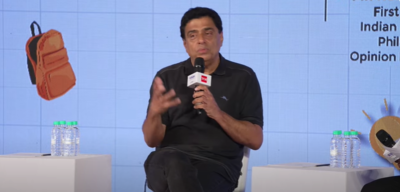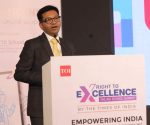Online education must be viewed as a means of expansion, not substitution: Ronnie Screwvala at TOI RTE Online School Summit – The Times of India

Digital schooling has transformed education by breaking geographical barriers and expanding learning opportunities for students across the globe. As this shift continues to redefine modern education, it brings both challenges and possibilities that require innovative approaches and collective efforts.
To delve into these crucial issues, The Times of India hosted the Right to Excellence Online School Summit—a dynamic platform that brings together industry leaders, education experts, policymakers, and thought leaders. Organized in collaboration with 21K School, a pioneering online education platform, the event took place today, February 12 in New Delhi.
The summit featured in-depth discussions on vital topics such as strengthening digital infrastructure, enhancing the online learning experience, and exploring parental perspectives in this rapidly evolving educational landscape.
At an insightful fireside chat on the evolving landscape of education and careers, industry stalwart Ronnie Screwvala, first-generation Indian entrepreneur, philanthropist, opinion leader, and author shared his perspectives on how students and professionals must adapt to an ever-changing world. The session, titled Future-Proofing Education and Careers in a Disruptive World, brought together thought leaders to discuss the intersection of learning, technology, and ambition.
Moderating the discussion was Dash Sethi, a distinguished education branding architect, serial entrepreneur, and TEDx speaker. With palpable enthusiasm, he set the stage for a compelling conversation, beginning with a reflection on Screwvala’s formative years.
The role of schooling in personal growth
“I think the best memories you carry in life are actually your school days.” Screwvala reflected on his school-time memories during the conversation. “I think it is where deepest friendships are formed, it is a place from where you learn the most and your open-mindedness also comes from school days.”
He further added, “Even when people have amnesia, I think the first thing you go back to is 30 years, 20 years into your life. So it’s the, it’s the closest and fondest memories. It’s also the most important part of your life.”
Growing up in a lower-middle-class household, Screwvala emphasized that schooling was a collaborative experience for him. He said, “Some people take sports. I think I was blessed to be inclined towards theatre. And I think theatre taught me everything that I wanted to know today, which is soft skills, collaborativeness, participation, and a sense of self-confidence.”
The changing aspirations of India’s youth
Touching upon the aspirations of India’s youth today, he noted their remarkable ambition and curiosity. “They’re wired very differently. Their inquisitiveness and their curiosities are at a different level. I think the biggest challenge here is the sense of expectation of the youth. And I think if we disappoint them, we are disappointing ourselves as a society.” The key lies in maintaining a dynamic approach to change, ensuring that we serve their aspirations effectively.
Online education: An expansion, not a replacement
As the conversation pivoted towards online education, Screwvala articulated a nuanced perspective. “I think you should look at things as a choice. I mean, again, I think the choices we make are the most important. So online is not here to necessarily look at something that’s replacing it.” He further stated, “I think you’re giving optionality, and you’re giving choice and that is the bedrock of that. If you look at this as a change, it becomes a problem. It is optionality that excites us,” he said.
Further echoing similar sentiments he mentioned that online learning is not a replacement but an option—an added layer of choice and accessibility. “It’s about providing an alternative path, particularly for those who might not have access to formal education. Online education must be viewed as a means of expansion, not substitution.”
He reinforced this sentiment by pointing out a critical statistic: “If we look at our Gross Enrollment Ratios of working professionals, nearly 75 out of 100 individuals have not gone through formal higher education. We are not in a position to invest $100 billion into traditional infrastructure overnight. Instead, online learning provides an avenue for individuals to return to education at their convenience.”
He also mentioned that many students have to change schools frequently, and online schools will enable them to pursue their education. Furthermore highlighting the benefits of online schooling he said that it also provides students with the opportunity to pursue extracurricular activities.
Screwvala believes that online education is replacing conventional academic pathways. However, it should not be considered as an either, or situation as that brings forth a reluctance to change. It should rather be dealt with as an option. He mentions, “Sometimes it’s more about accessibility, sometimes it’s more about affordability.”
Artificial intelligence in education
When asked about the role of artificial intelligence in education, Screwvala highlighted two key aspects—AI as a learning tool and AI as an enabler for educators. He also mentioned that there is a misplaced fear that AI is a shortcut or a cheat sheet. Instead, we must embrace it as an augmentation tool that enhances pedagogy, streamlines curriculum design, and personalizes learning experiences. “I think we need to move away from the fact that it’s a doubt resolution context or it’s a cheat sheet. And if you sort of harness that, I think the biggest challenge today is acceptability.” said Scewvala. He acknowledged that while older generations grapple with AI’s acceptance, today’s students have naturally integrated it into their daily lives.
Social aspects of online education
The discussion then turned to the social aspects of online education. Screwvala acknowledged that peer-to-peer interactions in traditional classrooms remain invaluable. However, he argued that technology, when harnessed correctly, can facilitate similar forms of engagement. He stated that, “The reality is that for many students today, their best friends are bots. In a generation where your best friend is going to be a bot, you better be clear that you want to have an optionality where you want to get them around that. So that’s where we’re going to in the first place, and we can’t run away from that.”
Cutting off commute time
Elucidating on the benefits of online schooling, Screwvala mentioned, “You don’t need to spend 2 hours on transportation, then there’s the whole tuition part, and it allows you to actually have another life. It could be pursuing sports, chess, or anything else you want to do, and it’s not just about the optionality but of the extracurricular activities.”
Preparing students for the workforce
Finally, reflecting on how online education prepares students for the workforce, Screwvala underscored the importance of time management saying that the world has become excessively calendarised. He says, “I’ve seen that we’re kind of calendarized. I think the ability to shrink that calendar and give people the ability to pursue something else, which is their dream or their ability to participate in something, is very, very strong.”
A powerful closing message
In closing, he left the audience with a powerful message. “I also don’t see it as an if and or a win. We need to harness it because if we don’t, that’s where we get pushed to.” He says that we are often caught up in debates of either-or-traditional versus online, structured versus flexible. “The truth is, that the future of education is not about weighing sides but embracing choices. And therefore, I think we just need to accept it,” said Srewvala.
As the session concluded, it was evident that the discourse had sparked a profound dialogue on the evolving nature of education. The audience was left with much to ponder—on adaptability, choice, and the unyielding need to evolve in an era of relentless transformation.
















